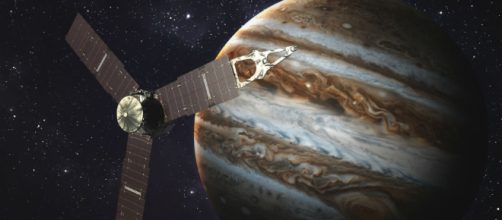Juno´s main engine burn has been postponed due to an equipment failure. It was found that two valves used in the firing of Juno´s principal engine did not function as they should and for this reason, the burning of the main engine, which should have slowed the velocity of the orbital period around Jupiter from 53.4 to 14 days, will be schedule for the next flyby which will occur on December 11th, as this is the most convenient time to ignite the spacecraft’s main engine.
October 19th flyby
On this date, juno spacecraft should be flying the closest to planet Jupiter on its north pole.
It was on this date that the vehicle´s main engine should be firing up its main engine with the purpose of reducing the spacecraft orbital period from 53 to only 14 days.; however due to a valve failure, the burning will be postponed. This delay will not reduce the gathering of scientific data, as all the scientific instruments will be functioning for this endeavor.
Helium check valves
Remote data showed that the two check valves that are operated at the time of the firing of Juno´s main engine did not function as expected during a command sequence performed some days ago. The valves, which should have opened within seconds, took more time to function; therefore, to understand the cause of this failure, the firing of the main engine, which should have set Juno in an orbital period of 14 days, has been delayed for the next flyby on December 11th.
Orbital maneuver
This is a burn of a spacecraft´s main engine to place the vehicle in a given orbit. It includes the use of propulsion systems to modify the orbit of a spacecraft. Juno was placed into a polar orbit, which is a special, orbit, allowing the spacecraft to navigate the giant planet from north to south, also avoiding the harmful radiation and permitting it to function for almost one year.
Science instrument gathering data
Originally, the number science instruments on during Juno flyby had been limited to a few; however, with the postponed period reduction maneuver, it´s expected that all scientific instruments on board will be functioning and collecting data during the upcoming flyby.
This will be a great moment for Jupiter´s exploration.
Juno´s mission
The spacecraft will study Jupiter´s atmosphere and the amounts of water and ammonia contain within; it will map the magnetic and gravitational field and reveal the gas giant planet´s internal structure. It will study the magnetosphere at the poles and the auras that form at the poles. Overall, the mission intends to reveal the origin and evolution of the gas giant planet and the origin of the solar system.

